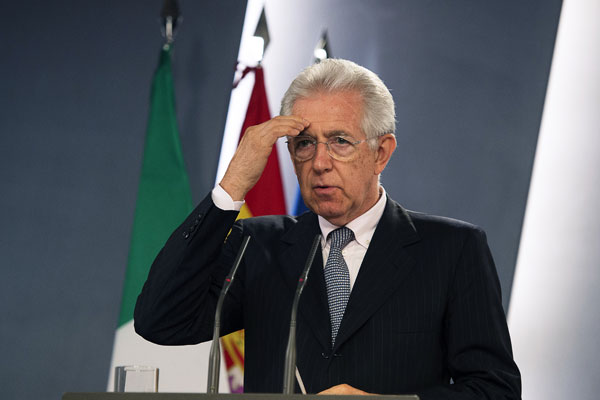
In an interview with Germany’s Der Spiegel magazine on Sunday, Italian Prime Minister Mario Monti warned of the “psychological break-up” of Europe if the euro crisis is not soon resolved.
To which there is only one thing to say: The European Union has been a schizophrenic construct from the very beginning, and the current, potentially fatal eurozone crisis was 100 percent predictable. History and the laws of economics are catching up with the European Union, and seems about to blow apart the EU’s artificial joining of the continent’s ancient and very diverse nations. You don’t often hear European leaders, let alone prime ministers, admit this obvious fact, though.
Monti stated that the Euro crisis was creating national resentments that could damage the EU. Actually, the resentments have been there for decades, caused by the gaping fault line—running roughly along the frontier of the Roman Empire—separating the EU’s northern countries from those of the south. The EU as a conceptual construct of the continent’s elites has never managed to bridge the economic, psychological, and cultural chasm within Europe.
Though Italy was one of the original six members of the European Coal and Steel Community, formed in 1951, it has never managed to claim status as one of the EU’s leading powers. The other countries of the southern tier joined the European project later after much reluctance and debate among existing members. Greece joined in 1981, Spain and Portugal in 1986. Within the EU, they have always been net recipient nations.
During the period of negotiations that created the euro in 1999, Italy was only reluctantly accepted by Germany into the eurozone. It was obvious then and now that the Italian economy came nowhere close to fulfilling the required debt-to-GDP ratio and other fiscal membership criteria.
The fact that Monti chose to deliver his message in a German magazine is no coincidence. The German–Italian relationship has long been on the rocks. Germans have little experience of Italians outside their annual vacations and sometimes refer to Italy as a “nation of waiters.” Furthermore, Germans are getting increasingly restive over the apparently unending requests for Germany to finance the EU’s faltering southern economies, a resentment voiced with growing frustration by Chancellor Angela Merkel.
For their part, Italians don’t like being badgered by Merkel and European Central Bank officials about necessary belt-tightening and fiscal responsibility before the ECB will consider a bailout of the Italian economy.
As reported by The Wall Street Journal, during an all-night European summit in June, Monti told Merkel that he would refuse to sign off on any deals unless she agreed to help Spain and Italy, whose borrowing costs were rising steeply. Merkel did not appreciate the ultimatum. “This is not helpful, Mario,” she said. “I know,” Monti replied.
For Obama Administration officials, who blindly bank on the EU as an international partner, the German–Italian spat should act as a warning on several fronts.
The EU is by no means a solid monolith. The EU itself will ultimately fail, and it will be the people across Europe who will suffer because of the hubris of the elites in Brussels. Equally importantly, reckless social welfare policies have brought southern Europe, led by Greece, into an impossible fiscal situation with national debt is spiraling wildly out of control.
These kinds of policies will have exactly the same effect on the U.S. economy—unless we reverse economic course and do it soon.































8 Replies to “Italian Prime Minister Warns of EU Collapse”